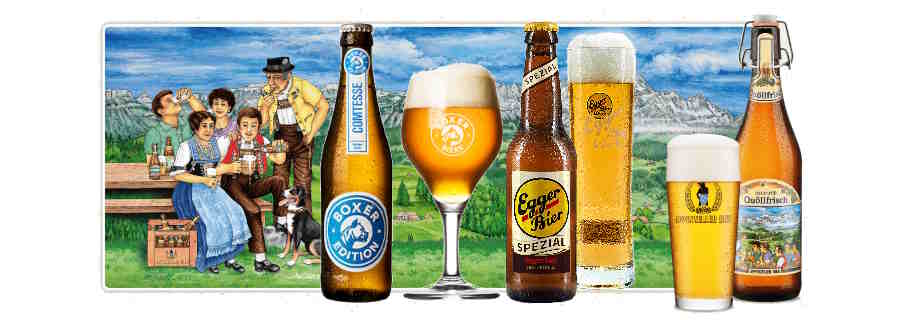The financial situation of medium-sized private breweries in Switzerland is more than tense. Within just two weeks, two traditional breweries, Egger in Worb and Chopfab Boxer in Winterthur and Yverdon-les-Bains, announced the entry of an investor.
In both cases, the Brauerei Locher AG, Switzerland's largest private brewery and known through its beer Quöllfrisch, is likely to play a significant role. Although all parties are trying to downplay Locher's role and are not providing clear information about the extent of their involvement, there are various indications of Locher taking a majority stake in both cases.
Last Friday, Albert Egger AG announced the long-awaited construction of a new brewing and bottling facility. However, contrary to earlier communication, the new brewery will not be built on an industrial site outside the city, but rather adjacent to the existing brewery in Worb, near the capital city of Bern. Interestingly, this land was recently acquired by Locher for this purpose. The previous owner, a demolition company, will gradually vacate the area over the next 18 months, facilitating the start of construction. Until then, beer will continue to be brewed at the existing brewery and bottled at Locher in Appenzell, as has been the case since 2021.
Back in September 2022, Egger Chairman of the Board Lorenz Hess referred to Brewery Locher as a "strong partner" for Egger. In addition to the land purchase, Locher has now also subscribed to shares in Egger and will provide the funds for investment in new technical equipment. It is understood that Egger will continue to operate as a separate entity in the future.
The second move by Locher was announced this morning to the approximately 90 employees of Chopfab Boxer AG. The brewery was formed in 2017 from the merger of the German-speaking Doppelleu Brauwerkstatt AG with the French-speaking Bière du Boxer SA and has struggled in recent years, not least due to the consequences of the COVID-19 pandemic and the unsuccessful introduction of the Cosmos beer brand. "Without restructuring measures, the existence is at risk," said Chopfab CEO Philip Bucher in an interview today.
As employees learned, there is a debt relief and restructuring plan in which Locher plays a crucial role. According to company statements, negotiations have been ongoing since December, and it now appears that the financing banks will have to accept a debt reduction, with Locher becoming a shareholder in Chopfab Boxer in return. "We are part of the solution, but the restructuring is hard work," said Locher CEO Aurèle Meyer to the Handelszeitung. We are trying "to give everything" to save Chopfab Boxer.
In the past, the Swiss beer market has been dominated by the two brewery groups Carlsberg (Feldschlösschen) and Heineken (Eichhof, Calanda). However, there are still around three dozen private breweries listed in the official Swiss tax-paying brewery list. Additionally, there are around 1,170 so-called microbreweries, which, however, do not have a significant output. According to a publication from the Statista Research Department in January, the total annual output of Swiss breweries was 3.6 million hectoliters. Only six breweries had an output of more than 100,000 hl. Beer imports account for about a quarter to a fifth of all beer consumed in Switzerland.
In recent years Brewery Locher has evolved as one of the major players, doubling its output over the past 10 years to capture approximately 14 percent of domestic production, according to figures from the Handelszeitung at the end of December. This brings it very close to the number two spot, held by Brewery Heineken, which produces around 16.5% of Swiss domestic production at its two brewing sites in Lucerne and Chur.
With this double strike, Brewery Locher gains an additional market share of around 4% from Chopfab Boxer and approximately 0.5% from Egger, allowing it to significantly surpass Heineken. Only the Feldschlösschen Group, owned by the Danish Carlsberg Group, remains substantially larger with a market share of around 40%.

